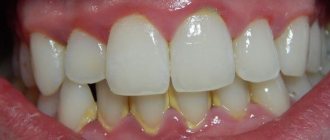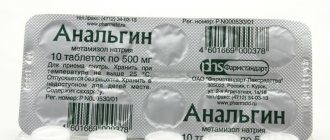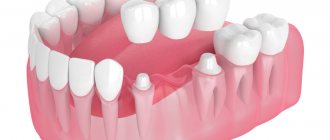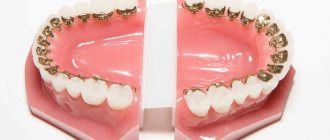Dentistry / Dentistry for pregnant women / Pain relief during pregnancy
One of the most common questions that specialists from SCNT “NOVOSTOM” have to answer is the possibility of using painkillers by pregnant women. Alas, it is impossible to answer unequivocally.
Pregnancy provokes hormonal changes in a woman’s body. And problems with teeth against this background are not uncommon. In this case, the body works on the principle “all the best goes to the child,” which is why women often experience a lack of nutrients, including calcium, which is necessary for teeth. In addition, if the oral cavity has not been sanitized, during pregnancy the process of reproduction of harmful bacteria is activated.
Dentists at the NOVOSTOM clinic recommend seeking professional orthodontic treatment immediately after the first symptoms occur. The discomfort a woman experiences due to toothache has a negative impact on the fetus. Therefore, it is better to immediately contact a specialist. But if this is not possible, you may need to take painkillers.
Headache medications you can take during pregnancy
Antispasmodics
Often the cause of pain can be a spasm of blood vessels in the brain, neck muscles or the back of the head.
In such cases, products that contain substances that relax the walls of blood vessels are effective. Due to this, the diameter of the vessels increases and blood circulation is normalized.
It is important to know that this group of drugs is effective for tension headaches.
Antispasmodics are the safest group of painkillers during pregnancy.
“No-spa” (“Drotaverine”) is a drug that helps relax smooth muscle cells. This drug affects not only the walls of blood vessels, but also the cells of the intestines, biliary system, urinary system, and uterus. It is for this reason that “No-spa” is successfully used during pregnancy with increased uterine tone.
Thanks to numerous studies, it has been revealed that this medicine does not have a negative effect on the fetus and does not cause developmental defects.
Application should be in acceptable therapeutic doses, since exceeding the dosage may lead to side effects:
- Decreased blood pressure (to the point of fainting).
- Heart rhythm disturbances (increased heart rate).
- The emergence of a tendency to constipation (due to decreased intestinal motility).
Contraindications for use are individual sensitivity to the active substance, hypotension from 90/60 mmHg. and below, tachycardia from 110 beats/min.
Combined antispasmodic analgesics, which in addition to the antispasmodic component contain another active ingredient - an analgesic, are prohibited for use during pregnancy. Such drugs include “Spazmalgon”, “Andipal”.
Medicines that lower blood pressure
One of the causes of headaches is increased blood pressure. For pregnant women, this situation is most relevant for a number of reasons:
- an increase in circulating blood volume during gestation by almost 40%;
- the development of gestosis, which is characterized by increased pressure, as well as fluid retention in the body;
- increased load on the cardiovascular system;
- exacerbation of existing chronic kidney and heart diseases.
Increased pressure is manifested by pain, most pronounced in the occipital region. There may be a feeling of heaviness in the head, flashing “spots before the eyes.”
Among the approved centrally acting antihypertensive drugs, they include (“Dopegit”) and a solution of “Magnesium sulfate” (“Magnesia”).
"Dopegit" acts on alpha-adrenergic receptors located in the brain.
It can be used during pregnancy for a number of reasons:
- There is no negative effect on fetal development.
- Adequate uteroplacental blood flow is maintained.
"Magnesia". When a pregnant woman experiences a headache associated with high blood pressure, the Magnesium sulfate solution is highly effective. In addition, it is a tocolytic (reduces the tone of the uterus), promotes the removal of fluid from the body (with edema).
This medicine is successfully used in obstetrics; it is especially necessary if a pregnant woman has gestosis, as it affects many parts of the pathogenesis.
The main route of administration is intravenous infusion, less often intramuscularly.
If necessary, tablet magnesium preparations (Magnerot, Magnelis, Magne-B6) are prescribed. Their effect appears gradually, the duration of therapy ranges from 10 to 30 days.
Preparations based on paracetamol
This group of medications can relieve pain of moderate intensity without harming the condition of the fetus.
The drug penetrates the placental barrier, but according to studies, Paracetamol does not have a toxic or teratogenic effect (does not cause developmental abnormalities) on the fetus. It should be remembered that the use of this drug should be limited.
Analogues of Paracetamol are Panadol, Efferalgan.
Ointments and gels: with caution
Pain in an expectant mother can be associated not only with the tone of the uterus and other pathologies of pregnancy. Bruises, dislocations, sprains, aching bones - in all these cases it is necessary to relieve pain locally.
The vast majority of creams and ointments are prohibited during pregnancy. You can use only a very limited range of drugs: Fastum-Gel, Doctor Mom, Traumeel and some others. Important: such drugs are used in exceptional cases, when the pain is severe and other drugs do not give the expected effect.
Attention, there are contraindications
The greatest caution should be exercised when deciding to use any external agent. Painkillers and suppositories also have a lot of contraindications. For example, papaverine, a good remedy for uterine tone, has a lot of side effects. In particular, the drug can cause constipation and lower blood pressure. Many medications are incompatible with kidney diseases, liver diseases, stomach ulcers and other pathologies. It happens that individual intolerance to the drug occurs. Its symptoms: itching, skin rashes, stomach pain, chills, fever. It is advisable to take any medications after consulting a doctor.
What drugs are dangerous for pregnant women?
The group of non-steroidal anti-inflammatory drugs is not recommended for use during gestation. However, if your headache is very severe and other medications do not help, then you should adhere to the following rules:
- Avoid the use of analgin-based products as the most toxic of all drugs in this group.
- It is not recommended to take combined analgesics that contain several components that relieve pain. These include: “Pentalgin”, “Caffetin”, “Solpadeine”.
- It is better to give preference to medications with one active ingredient (preferably paracetamol-based).
- Try not to take two or more tablets in one day, and also avoid long-term use.
- If possible, avoid taking pills in the first trimester, when the formation of fetal organs and systems occurs.
Is it possible for pregnant women to have dental x-rays?
Pregnancy is not considered a contraindication for dental radiography. Images are taken using computer radiovisiographs, which deliver a very small dose of radiation. The woman’s body is covered with a special protective apron, and the radiation beam is directed towards the jaw area.
However, such a procedure should be performed only when absolutely necessary and should be limited to taking pictures of one or two teeth. Long-term planned treatment, which periodically requires radiography, is best postponed until the birth of the child and completion of breastfeeding.
Non-drug methods
Given the small choice of medications for relieving headaches during pregnancy, it is worth giving preference to alternative methods.
Massage
It has been proven that running your fingers from the frontal part of the head to the back of the head (in one direction only) helps eliminate stagnation of venous blood in the sinuses of the brain. This is explained by the presence of perforating veins on the surface of the head, which are connected to the venous sinuses.
Such a massage for 15 minutes can significantly reduce pain, even eliminating it completely.
For more information on how to get rid of headaches with massage, watch the video:
Neck massage
It is especially effective if your head hurts due to osteochondrosis of the cervical spine. After all, the vertebral arteries pass through the cervical region, compression of which can cause excruciating pain in the head.
Reflexology
Impact on certain points of our body leads to the activation of certain physiological processes. So, for headaches, light pressure on the temporal areas on both sides is effective; you can use light massaging movements in a clockwise direction.
Doctor's advice
Neck massage can only be done in the form of light pressure on the muscles, stroking, and in no case too much. Firstly, movements with intense pressure will cause muscle pain. Secondly, there is always the possibility of a hernia, massage in which is done very carefully.
Victoria Druzhikina Neurologist, Therapist
Pressing on the following points will help relieve headaches: at the base of the inner edge of both eyebrows, the center of the superciliary arches (the exit point of the supraorbital nerve), the middle of the bridge of the nose, the point between the base of the 1st and 2nd fingers of both hands. You need to gently press on each point for 2-3 minutes.
Drinking strong tea with sugar
It is effective to drink a cup of strong tea for headaches associated with low blood pressure. Coffee drinks should not be consumed during pregnancy, as caffeine can cause increased heart rate. Use caution in case of diabetes mellitus and gestational diabetes mellitus, which is common among pregnant women.
Normalization of the daily routine
If a pregnant woman often has headaches, she needs to adjust her daily routine. Normalizing sleep and rest is very important. For example, walking for 15 minutes before bed is very beneficial. Pain will become much less of a problem if you pay due attention to rest.
Taking a warm shower
Promotes relaxation and improves blood circulation in the body.
You should not get carried away with aromatherapy, as some essential oils can cause an allergic reaction.
There are currently at least 50 known reasons why a headache may occur. During pregnancy, the most common are tension headaches, as well as headaches that occur when pressure rises (for example, with severe gestosis).
Despite such a wide range of drugs available on the pharmacological market, during pregnancy their choice is extremely limited. Therefore, during the period of bearing a child, before taking this or that medicine, it is necessary to find out the cause of the headache.
Unsystematic use of pills can negatively affect the baby's development. We must not forget about the serious causes of headaches (vascular aneurysm, pathological tortuosity, space-occupying brain formations). A consultation with a gynecologist and therapist will help you understand the mechanisms of pain, as well as prescribe the necessary medication.
This article has been verified by a current qualified physician, Victoria Druzhikina, and can be considered a reliable source of information for site users.
Bibliography
1. https://www.mediasphera.ru/issues/zhurnal-nevrologii-i-psikhiatrii-im-ss-korsakova/2015/11/downloads/ru/591997-729820151118 2. https://journals.eco-vector .com/RFD/article/viewFile/1431/1051
Rate how helpful this article was
2.5 4 people voted, average rating 2.5
Did you like the article? Save it to your wall so you don’t lose it!
Why do teeth hurt during pregnancy?
A pregnant woman may become a frequent visitor to the dentist. This is due to several factors:
- increased acidity of the oral cavity due to toxicosis;
- changes in hormonal levels, and, as a result, changes and metabolic disorders;
- lack of microelements and vitamins in the body.
All this provokes the occurrence of caries and inflammation of the gums and mucous membrane; may cause pain. You should not endure inconvenience: the psychological state of a pregnant woman is no less important than her physical health.
The changes that occur in the body due to pregnancy can also trigger the development of dental diseases.
Drug pain relief
For drug pain relief during childbirth, analgesia and anesthesia methods are used. They differ in that during analgesia they use drugs that only partially reduce pain, while during anesthesia the patient is completely anesthetized, often with the loss of motor functions and consciousness.
Analgesia is provided both during contractions and during childbirth, and anesthesia is most often used during a cesarean section, that is, during childbirth. Epidural anesthesia occupies a special place in this classification - it is used both to relieve pain during contractions and for anesthesia during childbirth or during surgery.
Take the first step
make an appointment with a doctor!
When is it necessary to consult a doctor?
It is necessary to consult a specialist and undergo diagnostic examinations if:
- sudden onset of severe headaches, their intensification and frequency;
- the appearance or intensification of pain during physical activity;
- the occurrence of additional symptoms - nausea, vomiting, difficulty swallowing, high temperature, increased blood pressure, pulsating tinnitus, increased urination, swelling, numbness of the limbs or face, visual or speech disturbances, lethargy, confusion.











